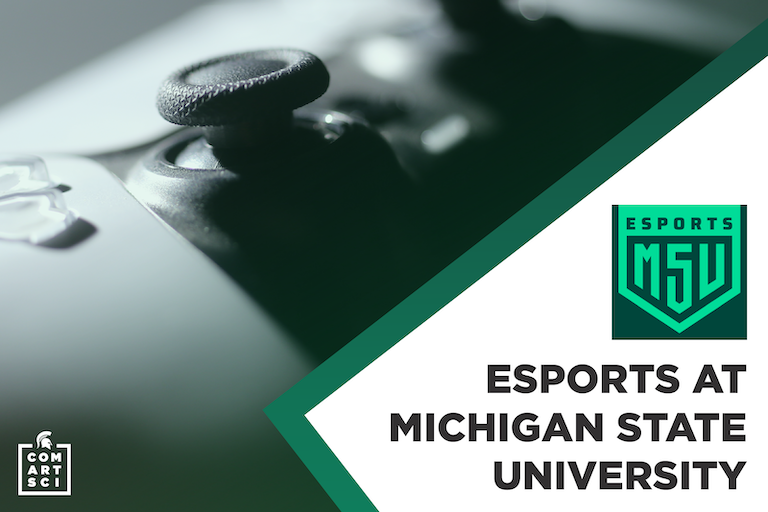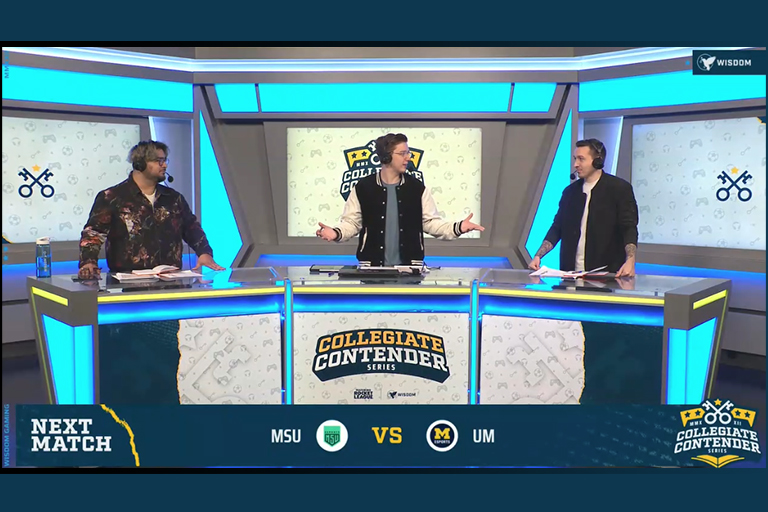When esports arrived on Michigan State University’s campus in 2016, it started with a group of college students that united under one idea: build a larger community rooted in the enjoyment of video games. That community became MSU’s Esports Club Association. Six years later, the ECA has more than 1,500 students and major university support.
The Michigan State Spartans are about to face off against the University of Michigan in the qualifier match. The broadcast commentators joke about whether there could be any sort of rivalry between these two universities, recounting the offensive and defensive strengths of each team this season. They talk of legacy, of up-and-coming players — and as the match begins, the cheers of a packed stadium echo as exciting passes are made, goals are scored and expectations are subverted.
This could be any number of popular sports, except for a few key differences: the players are driving virtual cars which launch into the air to make a play. Speed boosts are scattered across the pitch ready to give clever players an advantage, and the cheers coming through your speakers are expertly tuned sound effects to simulate the ambiance of a live sports venue.
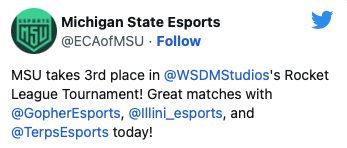 This is Rocket League. It’s one of several games in which MSU’s esports teams excel — and tournaments like this, the Collegiate Contender Series, are an opportunity to compete with fourteen college teams from across the country to take home $25,000 in scholarships.
This is Rocket League. It’s one of several games in which MSU’s esports teams excel — and tournaments like this, the Collegiate Contender Series, are an opportunity to compete with fourteen college teams from across the country to take home $25,000 in scholarships.
“Rocket League is going to remain popular for a very long time, in part because the rules are easy to explain to complete outsiders,” said Ryan Thompson, an instructor in the Department of Media and Information. “It’s RC car soccer. Now I know everything there is to know about the game, and anybody who doesn’t play video games understands that concept, right? Remote control cars moving up and all around is fun. And importantly, it’s nonviolent in every way.”
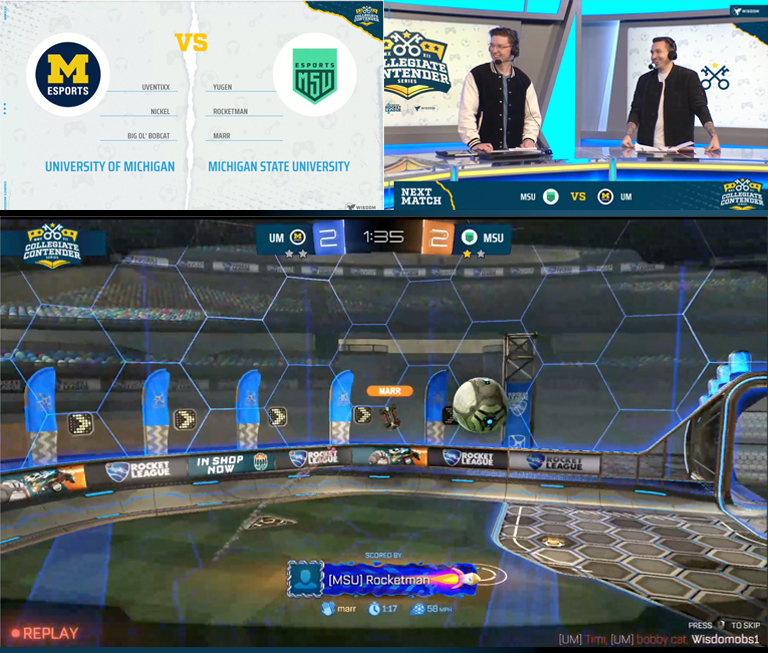
New Challenger Approaching!
Just like millions of fans tune in to watch other collegiate sports, esports draw in comparable viewership to professional sports leagues in the more traditional sense, a trend that has been especially strong since 2020 with the beginning of the COVID-19 pandemic. Amidst worldwide growth and appeal, esports is now being considered by athletic directors nationwide for inclusion in NCAA divisions, and by the International Olympic committee for future inclusion in the Olympics.
In East Lansing, MSU is set to debut its official competitive varsity esports team in the fall of 2023. Earlier this year, the College of Communication Arts and Sciences welcomed the university’s inaugural Director of Esports, Christopher Bilski, with a goal of leveling up MSU’s collegiate esports involvement. MSU’s first dedicated esports spaces, located in ComArtSci and Hubbard Hall, are also on track to open in 2024.
“Esports has exploded in the past few years,” said Bilski. “In Michigan, there are now roughly 35 varsity programs with some offering scholarships up to full rides. That’s just a piece of a national trend that has shown no signs of slowing down. Esports clubs have become some of the largest student organizations across campuses, and at Michigan State, our esports club currently has over 500 active members.”
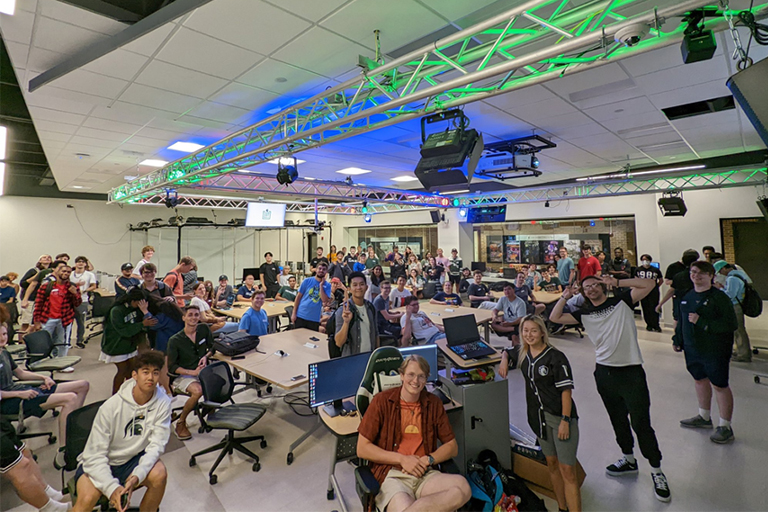
Photo: First Meeting of MSU League of Legends Club for Fall 2022.
One of those members, and current club president, is Dylan McCarroll. “For the longest time, collegiate esports has been a grassroots movement, started by esports people who happened to be in college,” McCarroll said. Video games have given McCarroll a chance to connect with new people, and he sees an opportunity to include groups that have been historically pushed out of traditional sports.
“There is a magic of spontaneity and community to esports that doesn’t exist in normal athletics, due to just how accessible video games are to play right now,” said McCarroll.
Bilski agrees, noting that esports can be a powerful tool for students to develop soft skills and find a sense of community. “It allows a space for students to find others who are passionate about the same things you are and can provide a structured space to develop healthy habits around gaming. Academically, esports can enhance what students are already learning in the classroom by providing real-life opportunities to utilize their skills or add to their portfolios.”
Let’s a-Go!
Thompson’s start with esports at MSU began while he was teaching a livestreaming class on campus, and was, essentially, recruited by the students themselves to become the advisor to the Esports Club Association (and later, the interim director of esports.) While he saw firsthand how impactful the esports experience was for students, he also understood the caution Big Ten universities might feel to go all-in on official collegiate esports teams.
“We introduce things that we know are going to work; we build over years because we’re institutions that span centuries at some level,” Thompson said. “One of the reasons that we are being spotlighted right now is we are the top public institution for game development in the country.”
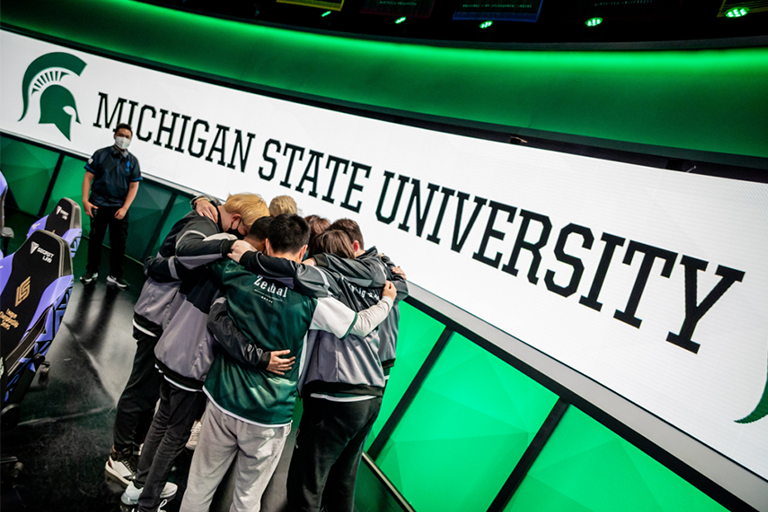
MSU’s esports teams have already made a strong showing in the competitive arena with games like League of Legends, Counter Strike, Super Smash Bros. and Rocket League. Thompson posits organized teams for other games will be coming soon under Bilski’s leadership, in addition to strengthening ties to academic programs and the overall college experience.
“Here at Michigan State, we are taking a holistic approach to esports, including looking at more than just competition,” said Bilski. “We are building our vision based on four different pillars of campus, club, competition, and career. This means that we are investing time and resources into opportunities that will impact all students, not just our competitive players.”
For McCarroll, it’s achieving the same legitimacy as traditional athletics that he and the other members of the ECA will continue to champion. While he notes that events like the Collegiate Contender Series inviting Big Ten universities to compete “would have been unheard of a half-decade ago,” he also believes there is still work to be done.
“The hardest part of getting anything off the ground is convincing people to care, and that’s where we’re going to have to really focus on in the future,” said McCarroll.
Achievement Unlocked: Gain a Transferable Skill
Part of what lends a certain legitimacy to collegiate athletics is the real potential for an athlete to move forward professionally in that sport after graduation. In its simplest terms, it is a career pathway centered around playing a game … but can the same be true for esports and video games?
Thompson, Bilski and McCarroll each enthusiastically agreed: yes.
Bilski began his career as an esports journalist, through which he became connected with collegiate esports coaching opportunities. “Just like you would find in any professional sports organization, there are opportunities in broadcasting, journalism, event management, social media and many more,” Bilski said. “We offer many majors and programs that can help connect students with these careers.”
McCarroll stressed that being a part of the larger system of competitive gaming and its events provide a multitude of entrance points to professional esports.
“Like football, hockey, or cricket, you of course have the players, who are the ones in the spotlight,” said McCarroll. “But the coaches, support staff, broadcast teams, advertising teams and so many other areas of expertise are incredibly important in facilitating player success.”
That success can translate to substantial prizes for a game well played — for instance, MSU’s Counter Strike team took home $26,000 last year. More broadly, esports is a viable industry expected to exceed $1.6 billion in revenue by 2024. (Translation for the parents reading this: yes, there is actual income to be made through a career in esports.) These are figures technology and media companies are certainly noticing, adopting strategies to increase their foothold in the global market’s potential … and staffing appropriately. College graduates with experience in this arena are well-positioned to fill these roles.
McCarroll applauds the moves colleges are making towards supporting esports programs, reiterating that the skills learned — whether in competition or outside of gaming — can transfer into wherever the future takes them.
“By far though, the biggest benefit of esports at a college campus is community,” he said. “Esports, by their nature, have an extremely low barrier to entry, and this helps facilitate an environment of inclusion. Competition can sometimes be hard to find for people of certain gender, ethnicity, or socioeconomic status, especially in college. But with video games, it gives co-ed athletics a chance to shine, helps reduce economic barriers, and most notably, gives international students a common interest with local students.”
And that’s as good a reason as any to grab a controller and join a club.
— Jessica Mussell
